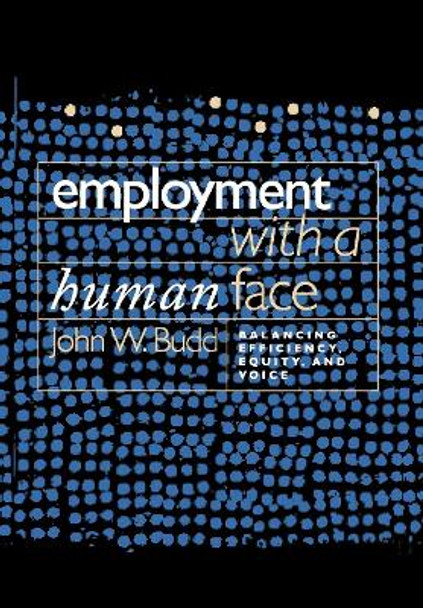Description
John W. Budd contends that the turbulence of the current workplace and the importance of work for individuals and society make it vitally important that employment be given "a human face." Contradicting the traditional view of the employment relationship as a purely economic transaction, with business wanting efficiency and workers wanting income, Budd argues that equity and voice are equally important objectives. The traditional narrow focus on efficiency must be balanced with employees' entitlement to fair treatment (equity) and the opportunity to have meaningful input into decisions (voice), he says. Only through a greater respect for these human concerns can broadly shared prosperity, respect for human dignity, and equal appreciation for the competing human rights of property and labor be achieved.
Budd proposes a fresh set of objectives for modern democracies-efficiency, equity, and voice-and supports this new triad with an intellectual framework for analyzing employment institutions and practices. In the process, he draws on scholarship from industrial relations, law, political science, moral philosophy, theology, psychology, sociology, and economics, and advances debates over free markets, globalization, human rights, and ethics. He applies his framework to important employment-related topics, such as workplace governance, the New Deal industrial relations system, comparative industrial relations, labor union strategies, and globalization. These analyses create a foundation for reforming employment practices, social norms, and public policies. In the book's final chapter, Budd advocates the creation of the field of human resources and industrial relations and explores the wider implications of this renewed conceptualization of industrial relations.
About the Author
John W. Budd is Industrial Relations Landgrant Professor at the Carlson School of Management, University of Minnesota. He is the coeditor of The Ethics of Human Resources and Industrial Relations, also from Cornell, and Labor Relations: Striking a Balance.
Reviews
In this book, John W. Budd articulates a stimulating (re)conceptualization of the employment relationship in modern society.... He brings together a rich treatment of industrial relations and human resource management perspectives under the eclectic rubric of HRIR. Budd concludes by making a valuable call for a renaissance in the subject area through stronger multidisciplinary linkages. The challenge is for those who study and research HRIR to make this a reality by taking forward the agenda with research and debate.
-- Tony Dundon * Comparative Labor and Policy Journal Vol 24 No 3 *This is a very good book.... Budd's scholarship is impressive, and he marshals his material in a clear, systematic fashion, which both affords a worthwhile taxonomy and also supports his theoretical position.... Budd takes an unfashionable direction by aiming to articulate explicit ethical points as the foundation for detailed analysis of industrial relations arrangements, but he does so deliberately and carefully is an attempt to show that popular economic models are not the only systematic basis that can be set out as a foundation for critical appraisal of work arrangements. It is difficult to imagine how he might have done better.
-- Chris Provis, University of South Australia * The Journal of Industrial Relations *Budd presents a powerful case for reform of American employment relations. He focuses primarily on three dimensions of work: efficiency, equity, and voice.... This book is a well-researched and thoughtful analysis of an important subject.
* Choice *Employment with a Human Face is essentially an argument in favor of equally balancing the needs of efficient production, labor market equity, and employee voice. According to Budd, this triad of employment concepts is often out of balance, and results in inefficient production, underemployment, or poor worker satisfaction. Balancing that triad, in Budd's view will provide the best of all possible outcomes for the employment relationship and for the economy at large.... The strength of the book comes in Budd's ability to line up different schools of thought about the employment relationship, such as industrial relations, human relations, or critical industrial relations, with their ethical underpinnings.
-- Joel Schoening, University of Oregon * Newsletter of Organizations, Occupations, and Work *It's a tall order to bring together the past century of labour relations research into a cohesive picture, especially if the system in question operates at various levels, from grievances on the shop floor to the globalization of labour standards. But Budd gives it the best shot in recent memory. Employment with a Human Face is really a book out of the blue.... Budd is an engaging writer with a talent for describing arcane IR topics in a way that is accessible not only to university students, but to anyone with even a passing interest in labour relations.... Employment with a Human Face offers much that is new. It is a work of original scholarship whose explanations of complex ideas are as clear as they are relevant.
-- Rafael Gomez, London School of Economics * Relations Industrielles/Industrial Relations *Awards
Winner of Winner of the 2004 Richard A. Lester Award given (.
Book Information
ISBN 9780801472602
Author John W. Budd
Format Paperback
Page Count 288
Imprint Cornell University Press
Publisher Cornell University Press
Weight(grams) 454g
Dimensions(mm) 235mm * 155mm * 18mm








